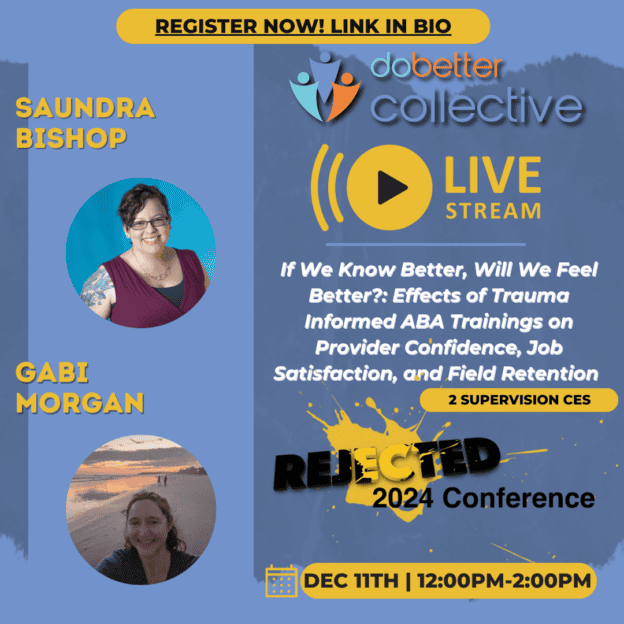Burn-out and turnover in the field of Applied Behavior Analysis is a significant concern industry wide. Research has suggested that one protective factor for burnout is perceived professional competency. Applied Behavior Analysis is beginning to move towards a more compassionate model, which involves trauma informed practices. However, there is a lack of training in this area. This workshop examines whether trauma informed ABA trainings affect provider confidence, job satisfaction, and intent to stay in the field. Saundra Bishop, BCBA, CCTP provided a 4 week Trauma Informed ABA Clinical Trauma series and she and Dr. Gabi Morgan did a small, imperfect study on the effects on provider skill growth on confidence, job satisfaction, and likelihood to stay in the field. The small study found that the trainings had a positive impact in all areas. In this webinar, attendees will be exposed to content from the trainings as well as discussing the findings.
Learning Objectives:
- Participants will recognize and define a trauma event in the context of ABA
- Participants will identify what research that has been conducted around working in “helping fields” and its impact on “burnout” and turnover
- Participants will define how trauma events can function as a setting event and apply it to a real case
- Participants will discuss limitations of field studies
- Participants will discuss implications of the results of the small, imperfect study which suggest that training in trauma informed ABA may increase provider confidence, job satisfaction, and intent to stay in the field.
PRESENTERS: Saundra Bishop, MS, BCBA, LBA CCTP
Saundra Bishop, MS, BCBA, LBA CCTP is the founder, Clinical Director, and Executive Director of the DC-based BASICS ABA Therapy. She is the former President of DCABA. She has over 22 years of experience working in Applied Behavior Analysis(ABA) and with people with Autism/Autistic people and has been a BCBA for 15 years. She is especially passionate about Trauma-Informed Behavior Management and on using teaching models that focus on self advocacy rather than compliance. She is a Certified Clinical Trauma Professional and also certified to give trainings that qualify for Type-2 CEUs, DC Public Schools CEUs, and Child and Family Services foster parent hours. She has experience in many roles as a BCBA. She has worked in homes, schools, clinical settings, group homes, hospitals, and also testifying as an expert witness. She has presented at conferences, workshops for organizations and parents, webinars, and as a keynote speakers on various topics including Trauma Informed ABA and reform in ABA. Additionally, she was written a handbook called the Trauma Informed Behavior Management Handbook. She enjoyed being a foster parent for 7 years and now has 4 wonderful daughters with and without special needs. She enjoys biking and competitive storytelling.
Gabi Morgan, Ph.D., BCBA-D
Gabi Morgan, Ph.D., BCBA-D is an assistant professor in applied behavior analysis at Bay Path University. She received her doctorate in ABA from Endicott College where her research focused on training teachers to use time-based schedules to prevent escalation of challenging behavior in preschoolers with backgrounds of traumatic events. Over the last 25 years she has sought to expand her knowledge and practice of ABA in her work with children of all ages and skill levels, their families, and in the training of others in ABA. Her research interests include exploring how ABA can help improve outcomes for children whose behavior has been shaped through challenging environments. She is dedicated to the dissemination of ABA especially and in guiding students of behavior analysis toward meaningful careers and a deeper understanding of the science of behavior


Responses